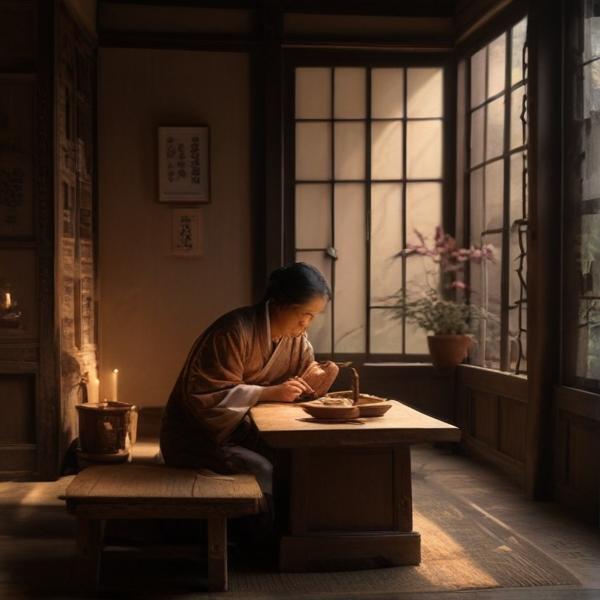基本信息 (Basic Information)
含义与用法 (Meanings & Usage)
中文核心释义 (Core Chinese Meaning): 一种植物,多指蓬草(如“飞蓬”);亦形容草多且杂乱,或事物蓬松、散乱的样子。
英文核心释义 (Core English Meaning): A type of plant (usually tumbleweed or Artemisia); also describes something bushy, fluffy, or disheveled.
象形意义 / 为何这么写 (Pictographic Meaning / Writing Rationale)
文言文释义 (Classical Chinese Meaning)
文言文中“蓬”主要指飞蓬这类植物,形容杂草丛生或头发散乱,与现代意义相近。In Classical Chinese, '蓬' mainly refers to plants like tumbleweed or describes wild, disordered growth; similar to the modern meaning.
深入学习 (In-depth Study)
字源故事 (Origin Story)
字形演变 (Character Evolution)
常用词语和例句 (Common Words & Examples)
蓬松 (fluffy; soft and loose)
她的头发又黑又蓬松。
Eng: Her hair is black and fluffy.
蓬草 (tumbleweed; bushy grass)
沙漠中常见滚动的蓬草。
Eng: Tumbleweeds can often be seen rolling in the desert.
蓬莱 (Penglai (a mythical land of immortals in Chinese legend))
传说中的蓬莱是神仙居住的地方。
Eng: Penglai in legend is the place where immortals live.
相关成语 (Related Idioms)
蓬头垢面
Meaning: disheveled hair and dirty face; unkempt appearance
多语言翻译 (核心释义) (Translations (Core Meaning))
- French: armoise (plante), ébouriffé, en broussaille
- German: Beifuß (Pflanze), struppig, zerzaust
- Spanish: planta de artemisa, despeinado, enmarañado
- Italian: artemisia (pianta), arruffato, spettinato
- Portuguese: artemísia (planta), desgrenhado, desalinhado
- Russian: полынь, взъерошенный, растрёпанный
- Arabic: نبات الشيح، أشعث، مبعثر
- Persian: گیاه شهر (درهموبرهم، ژولیده)
- Dutch: alsem (plant), warrig, pluizig
- Polish: bylica (roślina), rozczochrany
- Vietnamese: cây ngải cứu, rối xù, bù xù
- Ukrainian: полин, скуйовджений, розпатланий
视频学习资源 (Video Learning Resources)
通过以下链接在热门视频网站搜索 "蓬" 的更多讲解:
Search for more explanations of "蓬" on popular video sites:
- 在 Bilibili.com 搜索 "蓬 字形演变 说文解字" (Search on Bilibili)
- 在 YouTube.com 搜索 "蓬 Chinese character origin etymology" (Search on YouTube)
网络参考 (Web References for "蓬") ()
网络内容摘要 (Web Content Summary):
-
核心含义与字源:“蓬”主要指草本植物,特别是茂密丛生的杂草。其字形起源与“逢”有关,篆文字形像植物的藤蔓交错、相遇,形容草木交织在一起,茂密难行。 Core Meaning & Origin: "蓬" primarily refers to herbaceous plants, especially dense and bushy weeds. The character's structure is related to the character “逢” (to meet), with its ancient script depicting intertwined vines, representing thick and tangled vegetation.
-
扩展/比喻用法:“蓬”常引申为蓬松、杂乱的样子,尤其常用来形容头发散乱,如“蓬发”“蓬鬓”(散乱的头发或鬓发)。也可以指草木茂盛,如“蓬蓬”。 Extended/Metaphorical Usage: "蓬" is often used metaphorically for things that are fluffy or messy, especially referring to disheveled hair ("蓬发", "蓬鬓"). It can also describe flourishing plants ("蓬蓬").
-
特殊用法:“蓬”还可作量词,用于表示一丛、一团枝叶,如“一蓬竹子”、“一蓬花”。 Special Usage: "蓬" can also function as a classifier (measure word) for a clump or bush of plants, e.g., "一蓬竹子" (a clump of bamboo).
-
易混淆点:“蓬”有时和外形或发音接近的字(如“篷”:指帐篷、帆布等)混淆,学习时需注意区分语境和用法。 Common Confusion: "蓬" is sometimes confused with similar-looking or sounding characters, such as "篷" (tent, canopy), so be careful to distinguish them according to context.
-
常用词/成语:常见搭配有“蓬乱”、“蓬发”、“蓬勃”(比喻生命力旺盛)。 Common Words/Expressions: Usual phrases include "蓬乱" (messy), "蓬发" (unruly hair), and "蓬勃" (vigorous; full of vitality).
汉字"蓬"的起源、演变过程-汉字字源辞典
" 蓬 "的字源解说 夆 ,既是声旁也是形旁,是 " 逢 " 的省略,表示相遇。 蓬 ,篆文 ( 植物,藤蔓 ) ( 夆,即"逢",相遇 ),或 ( 植物,藤蔓 ) ( 逢,相遇 ),藤蔓相遇相簇, 造字本义:名词,比喻茂密丛生、阻道碍行的草莾 。
蓬的解释|蓬的意思|汉典"蓬"字的基本解释 - 漢典
比喻头发散乱);蓬乱(形容须发或草木凌乱);蓬发(蓬松、散乱的头发);蓬鬓(鬓发蓬乱) (3) 草木茂盛的样子 [flourishing] 。如:蓬蓬(茂盛、蓬勃的样子) 蓬 péng 〈量〉 用于枝叶茂盛的花草等的一团 [clump] 。如:一蓬竹子;满山毛竹,一蓬挨一蓬;一蓬金黄如紫红的光雾升上 ...
更多图片 (蓬 More Images) ()
